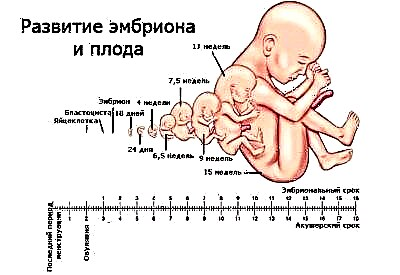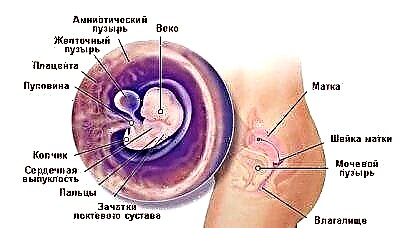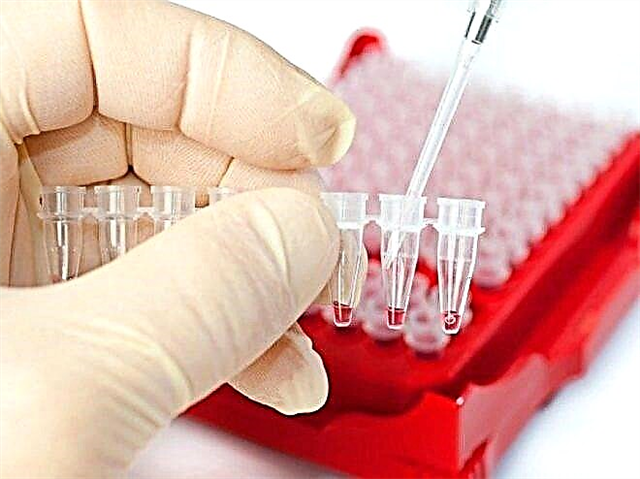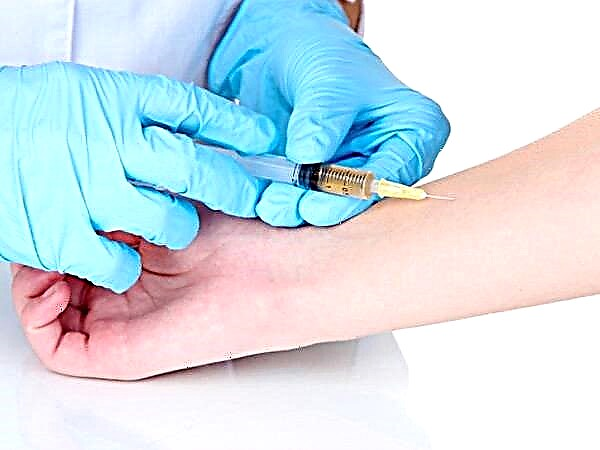
The fifth obstetric week of pregnancy is special. It is during this period that most women learn that they will soon become mothers. That is why this week will be remembered for many years. We will tell you about what is happening with the baby and the expectant mother in this material.

How many months is it?
5 obstetric week of pregnancy is the first 6 days of delay in the next menstruation. From conception is 3 weeks... Many women are confused about the difference in numbers. In fact, everything is simple. In medicine, it is customary to calculate the duration of pregnancy in obstetric weeks, they are counted from the first day of the last period to pregnancy.
Thus, obstetric pregnancy began about two weeks before conception took place.
Approximately in the middle of the menstrual cycle at the time of ovulation or a day after it, the meeting of the egg and sperm took place. This day is the beginning of the embryonic period. Since the time of onset of ovulation can vary, it is more convenient to count the gestational age from the first day of the last menstrual period. If the obstetric week is 4-5, this means that the most appropriate time has come to reliably make sure that there is a pregnancy.

How does the embryo develop?
Until recently, the baby was just a few cells that were constantly dividing, and by now they have turned into a spherical blastocyst, which, on the 8th day after conception, sank into the uterine cavity and anchored there. Now, almost two weeks after the completed implantation, the baby looks like a cylinder about 1.5-2 mm long. It is in the fifth obstetric week that he is officially referred to as an embryo.as the embryonic period of development begins.

Before that, the baby went through the germinal stage of development, then for 40 hours was in the implantation stage. All this time, the embryo could not be called an embryo, since in fact it was not yet. The stage that starts for him this week is the most responsible and important for the entire pregnancy.
Up to 9 weeks, when the embryonic period ends and the fetal (fetal) period begins, internal organs and systems will be actively formed, the first impulses of the nervous system will be debugged. Any harmful effect of teratogenic properties can cause mutations, gross anomalies and malformations, and fetal death.
The baby's airway is getting blocked this week. The trachea will begin to develop first, the lungs and bronchi will begin to form only after a couple of weeks. At 5 weeks after conception, the formation of the neural tube continues. How correctly this process will proceed depends on how the baby's brain and spinal cord will form, how his central nervous system will work. This week the neural tube is closing, closing.

At 5 obstetric weeks, that is, in the very next days, the baby will have sexual identification - gonoblasts will begin to form in the yolk sac - primary germ cells, which a little later will become either spermatozoa, if a boy is conceived, or eggs, if “settled in the womb " girl. At the cellular level these days, the laying of the digestive system and the genitourinary system takes place.
There is nothing humanlike in the image of an embryo yet. It looks like a tadpole with an oval head bud, a protrusion where handles will soon appear. However, at such an early stage, a tiny heart appears in the embryo. While it has only two atria, it will split into 4 chambers a little later. At the end of this embryonic week, the heart will begin to beat and soon it will be possible to see it as a slight flicker, and a little later it will be heard on the sensitive ultrasound machine.

To better imagine the size of the crumbs, you need to remember what a small grain of rice looks like. By the end of the 5th obstetric week, the growth of the embryo will approach 4 mm. This baby already requires respect for himself and it is in the fifth week that he begins to "seek" a certain freedom and independence, self-expression.
It is detached from the embryonic structures (chorion, amnion and yolk sac). Now a young placenta will begin to form, to which the embryonic structures by the end of the first trimester will fully transfer their responsibilities for the production of hormones, protection, and nutrition of the fetus.
The development of a tiny embryo proceeds at a very fast pace: both externally and internally, the baby changes every day. Never again in a person's life is development and growth so rapid and intense as in the embryonic period of his development.

Ultrasound
It is not always possible to see an embryo on an ultrasound scan during the fifth week. The crumb is still too small, not every scanner is able to identify it. But at the end of the week, at exactly 5 obstetric weeks, the chances that the baby is visualized are significantly increased.
Do not assume that an ultrasound scan will allow you to see the baby himself. At this time, pregnancy is at best defined as an echo-negative fluid formation, which is a gestational egg. Its average inner diameter is now about 4-5 mm. If ovulation was late, then the ovum will have a smaller SVD, and it will probably not be possible to see it at all on ultrasound this week.

In addition to size, the doctor always pays attention to the contours and outlines of the ovum. Normally, they should be smooth and clear. If the embryo is not yet visible, it is too early to sound the alarm.
The woman is assigned a second ultrasound in about a week.
A thickening of the endometrium, changes in the ovarian region indicate pregnancy. The size of the corpus luteum is normally from 19 to 29 mm, the size of the yolk sac at this time is less than 5 mm. The yolk sac may also not be detected in the fifth week due to its small size, but after 7 days it must be visualized if the pregnancy is proceeding normally.

An ultrasound examination this week is considered premature, since the risk of a false negative result is very high: they will not see the pregnancy, although it is there. In order to save their nerves, women who definitely want to receive documentary confirmation of the fact of their pregnancy should wait about another week, at 5-6 obstetric weeks, ultrasound diagnostics no longer cause difficulties.
If the woman has no history of miscarriages and the pregnancy occurred naturally, and not with the help of IVF, there is no need for ultrasound. And although the harm from ultrasound exposure to the fetus has not been proven, no one has yet been able to prove the harmlessness.
Experts recommend that you go for such a diagnosis only as directed by your doctor.

What does the expectant mother feel?
Some women don't feel anything out of the ordinary now. But the majority note that the state of health has changed - rapid fatigability appeared, they want to sleep and eat. There are also women who, at such an early stage, begin to feel toxicosis - they feel sick in the morning, sick from the previously pleasant smell of their husband's cologne. Feelings on a physical level may resemble premenstrual syndrome - slightly pulls the lower back, abdomen, as before menstruation.

Since the processes inside the female body are very intense and require a lot of energy, most pregnant women at 5 weeks notice that they want to sleep more and move less. The "quirks" can start now. As a rule, they relate to changes in taste preferences - you want pickles, chocolate, herring with jam, tomatoes with sugar, etc.
Medicine cannot thoroughly explain why such strange addictions arise, but there is a version that all these are signals of the body about the lack of certain substances necessary to ensure the growth of the embryo and changes in the body of the woman herself.

Changes in a woman's body
An objective change in this period is a delay that has been going on for several days. Outwardly, pregnancy has not yet manifested itself. But inside a woman there are numerous and very complex processes that should prepare her body for long-term gestation and childbirth. In some women, at this time, nipple halos begin to darken.
The breasts themselves slightly increase in size, there is a feeling of "fullness", fullness of the mammary glands, touching the nipples can cause pain, their sensitivity increases. Colostrum shedding at obstetric week 5 is more common in multiparous... Those who become pregnant with their first child may not have these symptoms.

All other changes in the female body occur due to changes in hormonal levels. From the first minutes after conception, the hormone progesterone begins to be produced in large quantities, which is necessary so that the muscles of the uterus do not strain, be relaxed, and also so that the maternal immunity does not destroy the embryo: the hormone reduces the ability of the immune system, the female defense is weakened, but in the baby's chances of survival are increased.
The hormone hCG contributes to the production of progesterone. It is produced by the chorionic membranes and enters the blood and urine of the expectant mother, increasing every two days. By week 5, according to obstetric calculations, the level of hCG becomes sufficient to diagnose pregnancy with express tests. These two hormones, essential for pregnancy, are also supported by estrogens, the female sex hormones.

Against the background of such a massive hormonal attack, the mood and psychological state of the expectant mother are usually the first to change. Already now, a woman can pay attention to the fact that she has become more anxious, tearful, sensitive, sentimental.
Under the influence of the hormone progesterone, digestion can be disturbed: heartburn appears or diarrhea begins. Some women emphasize that their sleep is disturbed, they have difficulty falling asleep, and they feel overwhelmed.
Progesterone increases appetite... The uterus begins to round, before conception it was more pear-shaped. This week, there is a slight increase in the female reproductive organ in volume. This can be the cause of slight pulling back pain. The amount of vaginal discharge may also increase.
Progesterone retains water in the tissues, this causes increased secretion. Many women experience increased salivation during sleep, for example.

The same property of progesterone determines the appearance of physiological rhinitis in pregnant women - many have a runny nose at 5 weeks without any other symptoms of a cold or ARVI. The hormonal "storm" in the female body is often the reason for the increase in body temperature in the evenings. The woman feels a slight chill, the temperature rises to 37.0 degrees or slightly higher. Many people start to worry if they are sick. Such symptoms have nothing to do with the disease. Usually there is no temperature in the morning.
But the basal temperature, which some women continue to change in the fifth obstetric week, is confidently kept at subfebrile values - progesterone, as long as its level is sufficient to maintain pregnancy, does not allow it to drop.

Possible problems
The very beginning of pregnancy is not only joy because “everything finally worked out”, but also the likelihood of a variety of problems that a woman should be aware of. Here are just a few of them.
Biochemical pregnancy
Medicine claims that about 70% of women have at least once in their life suffered a pregnancy that they did not even suspect, the so-called biochemical pregnancy. Any woman can theoretically face her precisely on this, fifth week, according to obstetric calculations. If, on the first or second day of delay, a particularly impatient expectant mother does a test or takes a blood test, then they confirm the pregnancy. The test shows a distinct second strip, the level of hCG corresponding to the period is determined in the blood.

But already in a day or two this week, menstruation may begin... This phenomenon is called biochemical pregnancy. In fact, the following happens: the egg is fertilized, implantation has taken place, but for some reason, almost immediately after implantation, the embryo is rejected, detached, and died.
The hCG hormone has time to be produced in certain quantities, and it is this concentration that is displayed during a blood test. And after another week, the embryo comes out, and it looks like an ordinary period, only a little delayed and a little more abundant than usual.

There are many reasons why a baby can stop developing after implantation. Often the root of the problem lies in the immune processes, sometimes in chromosomal abnormalities that have arisen during the fusion of the sperm with the egg. Often, biochemical pregnancy occurs in women with inflammatory diseases of the reproductive system, as well as with endocrine disorders. But the true reasons for this phenomenon have not been studied.
Biochemical pregnancy is not considered a miscarriage, it does not affect the subsequent pregnancy and the bearing of the child. Often the fact of such a pregnancy goes unnoticed at all, and a woman thinks that her periods just came with a slight delay. Symptoms and signs of normal pregnancy are usually absent.
The only way to establish BCB (abbreviated name for biochemical pregnancy) is a blood test for hCG.

Anembryony
This term denotes a pregnancy pathology in which there is no embryo inside the ovum. The egg itself usually grows, and the dynamics of its growth can be well tracked by ultrasound. At such a short time, anembryonia is often misplaced, and the reason lies in late ovulation. According to obstetric calculations, the woman is in her fifth week, but due to late ovulation and implantation, the ovum is still small and the embryo is tiny.

True anembryonia can be the result of adverse effects on the fetus - radiation, medications, poisons, unhealthy genetics. Usually the cause cannot be determined. The fifth week is too short a period for such a diagnosis. If now such an assumption has been made by the ultrasound doctor, you should calm down, wait 7-10 days and visit the ultrasound diagnostic room again.
During this week, you can do a blood test for hCG 2 times. With progressive pregnancy, the hormone levels will increase at a rapid rate.

At 6-7 weeks of pregnancy, the embryo on ultrasound should be clearly visible, regardless of the timing of the onset of ovulation. If anembryonia is confirmed, the woman will be shown curettage of the uterine cavity or medical abortion.
Frozen pregnancy
Pregnancy in the embryonic period can stop in development, stop progressing at any time, and there are many reasons for that. These are diseases of an inflammatory and infectious nature in a woman, her bad habits, stress, anxiety, excessive physical exertion. However, not everything depends only on the pregnant woman herself. If the embryo has abnormalities due to chromosomal abnormalities, then in many cases its further development becomes simply impossible.
Sometimes the cause of fading lies in the paternal spermatozoa - if the morphology of male germ cells is disturbed (teratozoospermia), conception, although difficult, is possible, but the risk of the formation of an incorrect fetus in terms of the genetic set is higher.

At week 5, it is difficult to recognize such an undeveloped pregnancy, but it is possible. If a woman suddenly disappears signs of toxicosis, which were already present, if her chest suddenly ceases to hurt, the general condition has changed and nothing indicates a probable pregnancy, with a great deal of truth we can say that fetal fading is possible. A blood test for hCG will be more informative. After intrauterine death of the embryo, the level of the hormone begins to decrease.
And two analyzes in dynamics in a week will be quite enough for the doctor to suspect something was wrong and send the woman for an ultrasound scan.

After about 2-3 weeks, the dead embryo, if the miscarriage has not occurred earlier, may begin to gradually be rejected by the mother's body. Brown spotting appears, pulling pains in the lower abdomen and lower back. When the diagnosis is confirmed, a woman undergoes surgical curettage and anti-inflammatory antibiotic therapy is prescribed or a medical abortion is performed.
It is advisable to examine tissue samples of the embryo in a genetic laboratory in order to try to establish whether certain chromosomal abnormalities and gene mutations were the reason for the arrest in its development. This information is essential to further planning your next pregnancy.

Ectopic pregnancy
As the name suggests, such a pregnancy is associated with the fixation of the fetus not in the uterus, but outside its cavity, for example, in the fallopian tube or in the cervix. The reasons for this phenomenon can also lie in a variety of pathologies of the female reproductive system, in hormonal disorders, in infectious diseases. At 5 weeks, an ectopic pregnancy is not always possible to establish.
The main sign of uterine pregnancy is the presence of a fetal egg in the uterine cavity. To see him at week 5, as we found out, is not always possible, and this does not mean that there is a mandatory pathology.
The only way to suspect such an abnormal pregnancy at such a short time is a blood test for hCG. The level of chorionic gonadotropin in the body with an ectopic embryo attachment is always significantly lower than the norm, a test strip from a pharmacy may generally show a negative result or a weak unexpressed second strip even a few days after the delay.

Based on a blood test, the diagnosis is not made, and doctors will prefer to wait another week to make sure that there is no ovum in the uterus. Symptoms at 5 weeks may not be, but it is possible that pains in the lower abdomen, on the right or on the left, may already appear, depending on where the ovum is specifically fixed. At week 5, the pain syndrome may appear in women in whom the embryo has "settled" in the narrowest part of the fallopian tube.
If the fetus is and develops in the widest part of the tube, then the symptoms will not begin before 8 weeks, and if the embryo is fixed closer to the ovary or in the abdominal part, then the first unpleasant signs usually appear by the end of the 6th week of pregnancy. In addition to pain, brown discharge with streaks of blood may appear.

Unfortunately, doctors cannot do anything. An ectopic pregnancy is doomed to be terminated. The task of doctors is to do this as early as possible, to prevent rupture of the fallopian tube or cervix. After such a pregnancy, if the tubes and ovaries were preserved, a new pregnancy is quite possible after a course of treatment.
If pregnancy is found in the cervix, then the prognosis is less optimistic. Usually, such a pathology (by the way, quite rare) requires surgeons to completely remove the uterus.

Early toxicosis
Early toxicosis is not such a rare occurrence. It all depends on how exactly it flows. Moderate nausea and even vomiting in the morning is a variant of the norm, but if the vomiting is exhausting, constant, it is repeated several times a day, the woman cannot eat, then this condition is fraught with dehydration and the threat of miscarriage.
Severe early toxicosis needs medical attention. A woman is injected with vitamin preparations to compensate the growing embryo for the lack of nutrients and minerals in the mother's blood. Toxicosis usually recedes closer to 12-13 weeks.
The reasons why some women have toxicosis, while others have no hint of nausea and dizziness, are not known for certain to medicine. Experts are inclined to believe that toxicosis is due to the individual characteristics of the woman's immune system, as well as to the changed hormonal background.

Diagnostics
The main symptom that a woman cannot go unnoticed in the fifth obstetric week is the absence of another menstruation on the appointed day. This means that now it is possible and necessary to find out the reasons for the delay. At this time, different methods can be used for diagnosis, with the exception of ultrasound, which, as a rule, cannot yet confidently answer the question of whether there is a pregnancy.
The hormone hCG, which began to be produced immediately after implantation, this week in the blood rises at least 60 times compared to its norm for non-pregnant women. A blood test from the very first day of the delay will leave no doubt that the woman is now pregnant. The hCG rate for this week is from 300 to 5000 IU / liter.

The concentration of chorionic hormone in the urine also exceeded the sensitivity thresholds for rapid tests, which can be purchased at any pharmacy without any problems. If the sensitivity threshold of the test is on average from 20 to 30 units per milliliter, then on the first day of the delay, the test will show a second strip.
Which of the ways to use to diagnose pregnancy at this time is up to the woman herself. A blood test has its advantages - it allows not only to establish a pregnancy, but also to make sure that it is developing normally if the hormone level is correct.
If the concentration of chorionic gonadotropic hormone is higher than normal, it would even be possible to assume that a woman has not one, but two embryos in the womb.

A decrease in the amount of hCG in the blood may indicate a threat of early miscarriage. A home express test, even the most expensive one, for example, an electronic one, will not give so much useful information. He will only show the fact of pregnancy without details. But it is easier to carry out, it does not require special training. Any woman can easily cope with the task.
In fairness, we note that the accuracy of a home test is lower than the accuracy of a laboratory blood test. Test strips are more likely to be defective, giving false positive and false negative results.
If it is the first week from the start of the delay (this is the 5th obstetric week), and the test is negative, then you should definitely donate blood for hCG and visit a doctor with this result.

Analyzes and examinations
On the pages of women's forums, there are serious disputes about when to contact the antenatal clinic for registration. There can be only one answer - the sooner the better. Early registration will allow you to identify possible pathologies at an earlier stage, for example, to detect an ectopic pregnancy at a stage when it is easy to carry out laparoscopic surgery and preserve women's reproductive health, and not when the growing fetus will tear the fallopian tube to shreds and to save the woman's life you will have to remove it completely.

Nobody, of course, forces a woman to go to the doctor immediately after a home test, which showed two cherished strips. But it is also not worth waiting for the pregnancy to "step over" 8-10 weeks. If you wish, you can close this issue for yourself once and for all by visiting a gynecologist at the end of the 5th obstetric week of pregnancy.
It is advisable to have the results of a blood test for hCG with you, so that the specialist does not have doubts about the fact of pregnancy, because manual research at this time does not always show a significant increase in the size of the uterus.

If such a decision is made, the woman should know that she will have time to prepare well for the first prenatal screening, which takes place from 10-11 to 13 weeks of pregnancy, inclusive. The preparation will consist in the unhurried delivery of all the tests required for registration, as well as visits to doctors of other specialties, which is recommended in the first trimester.
At the first visit to the doctor, the card of the pregnant woman and the woman in labor is filled in, a small copy of it is issued - an exchange card, which is given to the woman. Now this is her main document that you always need to carry with you, especially at the next appointment with a consultation. The results of all analyzes and ultrasound will be entered into the exchange card. It is with this card that a woman will enter the hospital when the due date comes.


The analyzes that will be prescribed in the first stage are numerous. These are general blood and urine tests, a vaginal smear for microflora, and detailed biochemical blood tests. You will definitely have to donate blood for HIV and syphilis, hepatitis, for TORCH infections (rubella, cytomegalovirus, herpes, toxoplasmosis). A woman must confirm her blood type and Rh factor.
If she has a negative Rh, her partner will have to come to the consultation in order to also donate blood for the group and Rh.
At the very beginning of pregnancy, blood tests for the content of hormones, as well as ultrasound of the pelvic organs with the threat of termination of pregnancy, can be prescribed according to individual indicators.

Recommendations
Despite the fact that you just learned about pregnancy, the lifestyle should be definitely adjusted taking into account the impending changes. The child will not be, he already exists, and right now the baby especially needs maternal protection and optimal conditions for its development. Simple guidelines will help the embryo develop correctly.
Vitamins
Already now the embryo and the maternal organism begin to feel the need for certain substances. This week, given that the fetal nervous system is actively forming, you should definitely start taking folic acid. It is optimal to take it before conception., but if this did not happen or the pregnancy was not initially included in the immediate plans of the couple, then now is the time to start supplying yourself and the baby with this useful substance.

In regions where there is no sea and sun, women are advised to additionally take iodine preparations. But there is no need to rush to buy vitamin complexes, which are widely advertised and quite expensive. It is worth waiting for the results of a biochemical blood test, which will also show how great a woman's need for certain minerals and vitamins is.
This is another big plus of early registration - there is an opportunity to choose an individual preparation that is necessary for this particular mother-to-be, containing multivitamins and minerals.
Sometimes vitamins and mineral supplements are recommended not to be taken as part of the complex, but separately.

Sex
You can have sex at obstetric week 5. The intimate life of the parents will not harm the child in any way, if the woman has no obvious contraindications. If sexual activity is still undesirable, the doctor will definitely inform the woman about this, taking into account her obstetric history. Contraindications include habitual miscarriages in the early stages, atypical discharge for this period, or pain in the abdomen.
Be especially careful after IVF, including in matters of active sexual life, because the uterus at the time of orgasm comes in tone, which can provoke detachment of the ovum.
If there are no contraindications, then having sex will only benefit the woman. They improve her mood, make his changes less noticeable, instill a sense of her own need and importance for this man, improve the microclimate in the family and the relationship between partners.
Now, normal relationships are more important than ever before, because the stresses caused by conflicts in the family, according to statistics, occupy one of the first places among the causes of spontaneous abortion at an early stage.

Nutrition
As soon as the test showed two stripes, the woman should think about proper nutrition. Despite the insistent demands of the body, which wants herring with jam or honey with bacon, it is worth taking the issue seriously and reconsidering your diet.
Proper nutrition will help keep the weekly weight gain under control, which has already begun, and will not allow a woman to gain extra pounds, which can significantly complicate the last months of carrying a baby and the upcoming birth.
Balanced split meals will reduce the effects of progesterone on digestion - will reduce gas formation, bloating, will prevent heartburn, constipation and diarrhea. Correctly selected products will supply the female body and the rapidly growing body of the crumbs with everything necessary.

First of all, you should give up fried, fatty, overly salty and sweet. It is important to eat fresh vegetables and fruits, lean meat, fish, dairy products.
You need to eat at least 5-6 times a day, the last meal - 3 hours before going to bed. Fluids should be drunk at least one and a half liters - now the embryo needs not only nutrients and vitamins, but also water. A woman "in position", even in the earliest terms, is contraindicated in carbonated drinks, shop juices in packs, buns, condensed milk, chocolate. The amount of salt should be reduced to 5 grams per day., so as not to create prerequisites for the appearance of edema and the development of gestosis, which is dangerous for the mother and the fetus.

Medicines
Quite often, in the first weeks of pregnancy, a woman's chronic diseases become aggravated, because the load on all organs increases tens of times. Reduced immunity at an early stage can cause infection with a viral or other infection. Doctors say that diseases at the beginning of gestation are not as dangerous as the uncontrolled intake of medications that are not agreed with the doctor.
Many drugs have a teratogenic effect, they are dangerous for the developing embryo. The most dangerous are antibiotics, immunostimulants, antidepressants, antiepileptic drugs, and many pain relievers.

Therefore, when a cough appears, if a toothache, head, stomach or kidneys hurts, you should not take medications that have always helped in these situations, no matter how great the temptation. Pills that a woman took before pregnancy can cause serious harm in the early stages.
The best solution is to see a doctor for pain. He will be able to select drugs that can be taken by pregnant women, and if there are none, he will suggest a couple of recipes from the field of alternative medicine that will help a woman to alleviate her condition. The less pills and capsules are eaten by the mother before the 12th week of pregnancy, the fewer injections are given, the better for the fetus.

Working conditions
The fifth week should be a turning point in the woman's work routine. If her work is connected with shift work at night, then now is the time to take a certificate from the antenatal clinic and show it to her superiors so that the work schedule will be changed exclusively to daytime.
Night sleep is important for any person, since it is at night that some hormones, protein compounds, and enzymes important for health are synthesized. For a pregnant woman, a night's sleep is doubly important.

The Labor Code of the Russian Federation allows expectant mothers, on demand, to receive a time-limited and strictly limited working day, safe and harmless working conditions, and a lunch break. Many are afraid to ask their management for this because they fear dismissal. It is illegal to fire a pregnant woman, so there is absolutely nothing to worry about.
Women in the early stages are contraindicated to work in paint shops, in workshops with strong noise and vibration, in industries associated with electromagnetic or radiation exposure. A woman has the right to refuse long business trips, from overtime work. For early registration, a small amount is added to maternity payments within 600 rubles.

Lifestyle
Two strips on the dough is not a reason to sit on the sofa and sit there all 9 months. At this time, a woman should continue to lead her usual lifestyle. If she played sports, then physical activity should be slightly reduced., but there is no need to give them up, of course, if the doctor permits.
If a woman did not go in for sports before, it's time to start doing light exercises in the morning, and in the evenings to visit the pool, swim, do water aerobics, take evening walks in the fresh air before going to bed. Such a lifestyle will not be associated with excessive stress, but it will not allow leading a hypodynamic lifestyle, fraught with excess weight, difficult childbirth, and a long postpartum recovery period.

Alcohol and nicotine
Many women are interested in the effect on the child of alcohol and nicotine, which the woman may have taken before she found out that she was pregnant. If alcohol does not imply chronic alcoholism, the systematic intake of strong alcoholic beverages in large quantities, then there is no harm to the embryo. The main thing is to abstain now and not allow the intake of strong drinks.

With nicotine, things are a little more complicated. If we are talking about a chronic smoker who has had this bad habit for 10 years or more, then you should consult a doctor - in some cases, a complete rejection of cigarettes provokes a miscarriage, since it leads to a withdrawal syndrome associated with changes in blood pressure, changes in hormonal levels ...
Such pregnant women are sometimes offered as an exception cigarettes with a lower nicotine content and a decrease in the number of cigarettes smoked to 1-2 per day.
If everything is not so neglected, then a woman is advised to quit smoking immediately after detecting two stripes on a rapid test. Nicotine is very dangerous during the period when the nervous system, as well as the baby's heart and blood vessels, is being formed.

Reviews
Many women during this period are actively discussing the reaction of their husbands to the news that the family will soon have an addition. Men do not always react to this with sincere joy, and therefore there are more than enough reasons for worries for expectant mothers now. Many are trying to sign up for an ultrasound scan this week in order to be confident in their imminent motherhood.
A lot of questions and doubts this week are caused by tests and their results. The most accurate, but expensive, women are almost unanimously considered electronic tests, which, by the concentration of hCG in the urine, indicate the estimated period in weeks. Those who have already begun toxemia are at a loss, because, according to everyone's opinion, it is too early for nausea, but medicine claims that this is also a variant of the norm.

See what happens in the 5th week of pregnancy in the next video.



